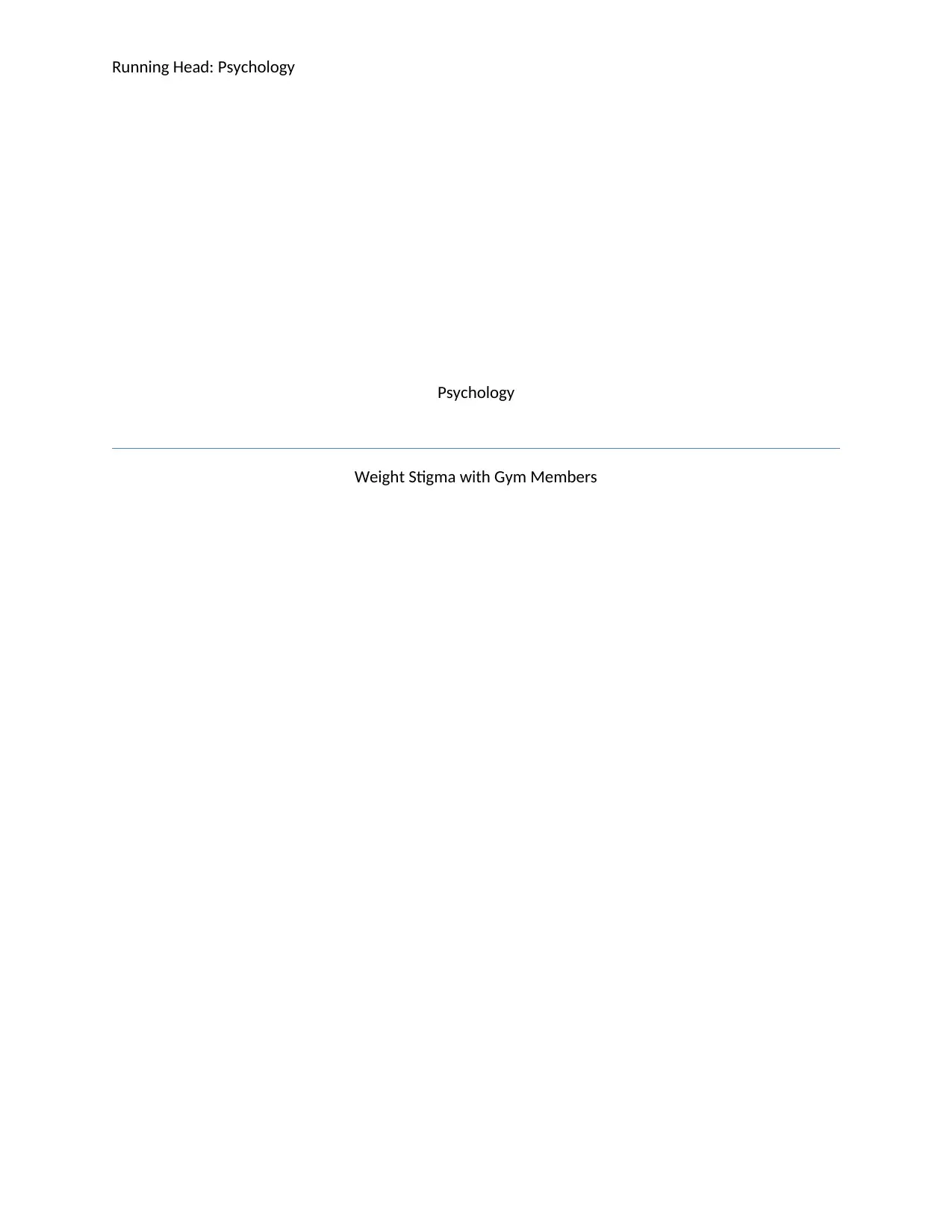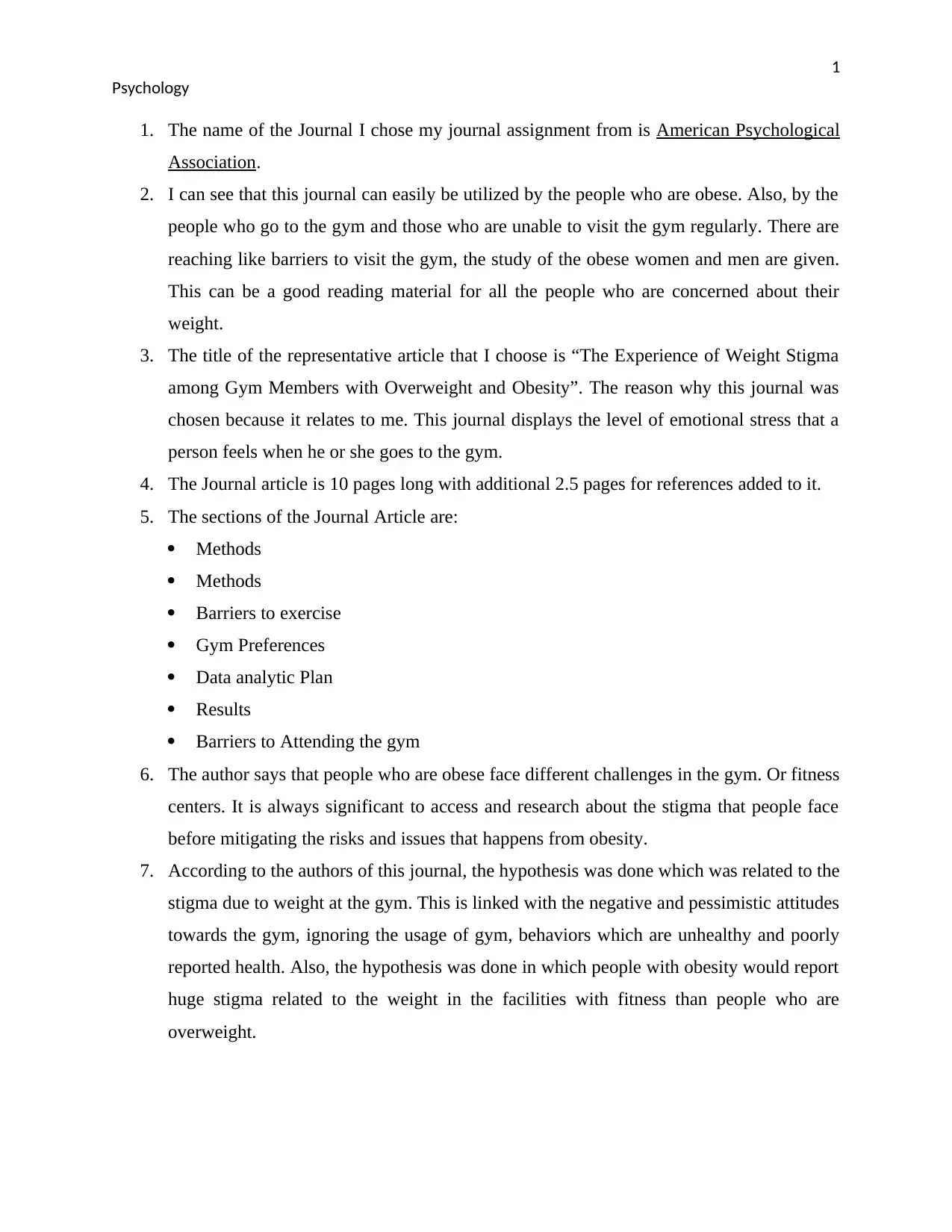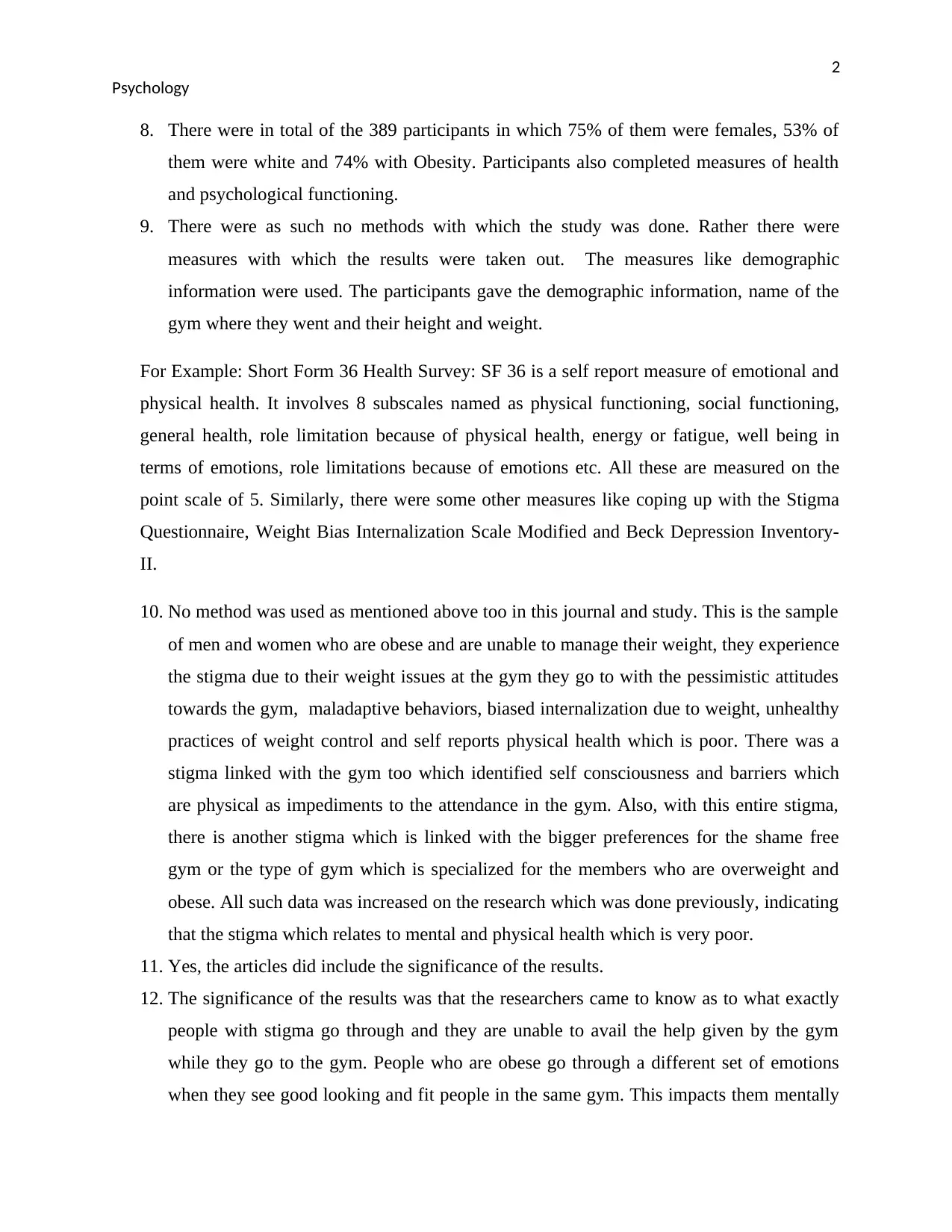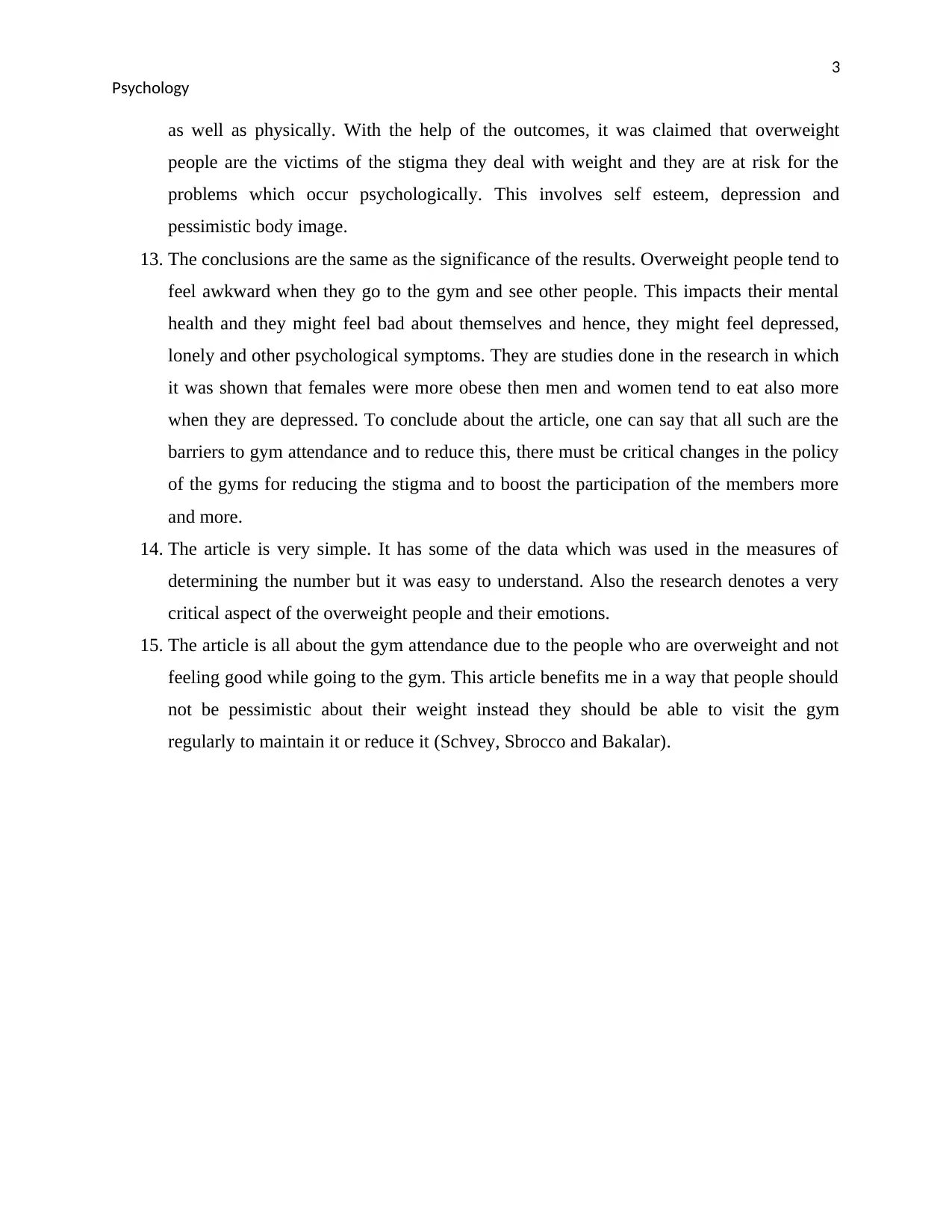Psychology: Exploring Weight Stigma Among Gym Members Article
VerifiedAdded on 2023/06/11
|5
|1151
|410
Homework Assignment
AI Summary
This assignment is a review of a research article from the American Psychological Association focusing on the experience of weight stigma among gym members with overweight and obesity. The assignment identifies the journal, its target audience, and the chosen article's relevance. It summarizes the article's methodology, including participant demographics (389 participants, 75% females, 53% white, 74% obese) and measures used such as the Short Form 36 Health Survey, Coping with Stigma Questionnaire, Weight Bias Internalization Scale Modified, and Beck Depression Inventory-II. The study's findings highlight the challenges faced by obese individuals in gym settings, linking weight stigma to negative attitudes, maladaptive behaviors, and poor self-reported health. The conclusion emphasizes the need for policy changes in gyms to reduce stigma and promote greater participation, noting that overweight individuals often experience psychological distress like low self-esteem and depression due to perceived stigma.

Running Head: Psychology
Psychology
Weight Stigma with Gym Members
Psychology
Weight Stigma with Gym Members
Paraphrase This Document
Need a fresh take? Get an instant paraphrase of this document with our AI Paraphraser

1
Psychology
1. The name of the Journal I chose my journal assignment from is American Psychological
Association.
2. I can see that this journal can easily be utilized by the people who are obese. Also, by the
people who go to the gym and those who are unable to visit the gym regularly. There are
reaching like barriers to visit the gym, the study of the obese women and men are given.
This can be a good reading material for all the people who are concerned about their
weight.
3. The title of the representative article that I choose is “The Experience of Weight Stigma
among Gym Members with Overweight and Obesity”. The reason why this journal was
chosen because it relates to me. This journal displays the level of emotional stress that a
person feels when he or she goes to the gym.
4. The Journal article is 10 pages long with additional 2.5 pages for references added to it.
5. The sections of the Journal Article are:
Methods
Methods
Barriers to exercise
Gym Preferences
Data analytic Plan
Results
Barriers to Attending the gym
6. The author says that people who are obese face different challenges in the gym. Or fitness
centers. It is always significant to access and research about the stigma that people face
before mitigating the risks and issues that happens from obesity.
7. According to the authors of this journal, the hypothesis was done which was related to the
stigma due to weight at the gym. This is linked with the negative and pessimistic attitudes
towards the gym, ignoring the usage of gym, behaviors which are unhealthy and poorly
reported health. Also, the hypothesis was done in which people with obesity would report
huge stigma related to the weight in the facilities with fitness than people who are
overweight.
Psychology
1. The name of the Journal I chose my journal assignment from is American Psychological
Association.
2. I can see that this journal can easily be utilized by the people who are obese. Also, by the
people who go to the gym and those who are unable to visit the gym regularly. There are
reaching like barriers to visit the gym, the study of the obese women and men are given.
This can be a good reading material for all the people who are concerned about their
weight.
3. The title of the representative article that I choose is “The Experience of Weight Stigma
among Gym Members with Overweight and Obesity”. The reason why this journal was
chosen because it relates to me. This journal displays the level of emotional stress that a
person feels when he or she goes to the gym.
4. The Journal article is 10 pages long with additional 2.5 pages for references added to it.
5. The sections of the Journal Article are:
Methods
Methods
Barriers to exercise
Gym Preferences
Data analytic Plan
Results
Barriers to Attending the gym
6. The author says that people who are obese face different challenges in the gym. Or fitness
centers. It is always significant to access and research about the stigma that people face
before mitigating the risks and issues that happens from obesity.
7. According to the authors of this journal, the hypothesis was done which was related to the
stigma due to weight at the gym. This is linked with the negative and pessimistic attitudes
towards the gym, ignoring the usage of gym, behaviors which are unhealthy and poorly
reported health. Also, the hypothesis was done in which people with obesity would report
huge stigma related to the weight in the facilities with fitness than people who are
overweight.

2
Psychology
8. There were in total of the 389 participants in which 75% of them were females, 53% of
them were white and 74% with Obesity. Participants also completed measures of health
and psychological functioning.
9. There were as such no methods with which the study was done. Rather there were
measures with which the results were taken out. The measures like demographic
information were used. The participants gave the demographic information, name of the
gym where they went and their height and weight.
For Example: Short Form 36 Health Survey: SF 36 is a self report measure of emotional and
physical health. It involves 8 subscales named as physical functioning, social functioning,
general health, role limitation because of physical health, energy or fatigue, well being in
terms of emotions, role limitations because of emotions etc. All these are measured on the
point scale of 5. Similarly, there were some other measures like coping up with the Stigma
Questionnaire, Weight Bias Internalization Scale Modified and Beck Depression Inventory-
II.
10. No method was used as mentioned above too in this journal and study. This is the sample
of men and women who are obese and are unable to manage their weight, they experience
the stigma due to their weight issues at the gym they go to with the pessimistic attitudes
towards the gym, maladaptive behaviors, biased internalization due to weight, unhealthy
practices of weight control and self reports physical health which is poor. There was a
stigma linked with the gym too which identified self consciousness and barriers which
are physical as impediments to the attendance in the gym. Also, with this entire stigma,
there is another stigma which is linked with the bigger preferences for the shame free
gym or the type of gym which is specialized for the members who are overweight and
obese. All such data was increased on the research which was done previously, indicating
that the stigma which relates to mental and physical health which is very poor.
11. Yes, the articles did include the significance of the results.
12. The significance of the results was that the researchers came to know as to what exactly
people with stigma go through and they are unable to avail the help given by the gym
while they go to the gym. People who are obese go through a different set of emotions
when they see good looking and fit people in the same gym. This impacts them mentally
Psychology
8. There were in total of the 389 participants in which 75% of them were females, 53% of
them were white and 74% with Obesity. Participants also completed measures of health
and psychological functioning.
9. There were as such no methods with which the study was done. Rather there were
measures with which the results were taken out. The measures like demographic
information were used. The participants gave the demographic information, name of the
gym where they went and their height and weight.
For Example: Short Form 36 Health Survey: SF 36 is a self report measure of emotional and
physical health. It involves 8 subscales named as physical functioning, social functioning,
general health, role limitation because of physical health, energy or fatigue, well being in
terms of emotions, role limitations because of emotions etc. All these are measured on the
point scale of 5. Similarly, there were some other measures like coping up with the Stigma
Questionnaire, Weight Bias Internalization Scale Modified and Beck Depression Inventory-
II.
10. No method was used as mentioned above too in this journal and study. This is the sample
of men and women who are obese and are unable to manage their weight, they experience
the stigma due to their weight issues at the gym they go to with the pessimistic attitudes
towards the gym, maladaptive behaviors, biased internalization due to weight, unhealthy
practices of weight control and self reports physical health which is poor. There was a
stigma linked with the gym too which identified self consciousness and barriers which
are physical as impediments to the attendance in the gym. Also, with this entire stigma,
there is another stigma which is linked with the bigger preferences for the shame free
gym or the type of gym which is specialized for the members who are overweight and
obese. All such data was increased on the research which was done previously, indicating
that the stigma which relates to mental and physical health which is very poor.
11. Yes, the articles did include the significance of the results.
12. The significance of the results was that the researchers came to know as to what exactly
people with stigma go through and they are unable to avail the help given by the gym
while they go to the gym. People who are obese go through a different set of emotions
when they see good looking and fit people in the same gym. This impacts them mentally
⊘ This is a preview!⊘
Do you want full access?
Subscribe today to unlock all pages.

Trusted by 1+ million students worldwide

3
Psychology
as well as physically. With the help of the outcomes, it was claimed that overweight
people are the victims of the stigma they deal with weight and they are at risk for the
problems which occur psychologically. This involves self esteem, depression and
pessimistic body image.
13. The conclusions are the same as the significance of the results. Overweight people tend to
feel awkward when they go to the gym and see other people. This impacts their mental
health and they might feel bad about themselves and hence, they might feel depressed,
lonely and other psychological symptoms. They are studies done in the research in which
it was shown that females were more obese then men and women tend to eat also more
when they are depressed. To conclude about the article, one can say that all such are the
barriers to gym attendance and to reduce this, there must be critical changes in the policy
of the gyms for reducing the stigma and to boost the participation of the members more
and more.
14. The article is very simple. It has some of the data which was used in the measures of
determining the number but it was easy to understand. Also the research denotes a very
critical aspect of the overweight people and their emotions.
15. The article is all about the gym attendance due to the people who are overweight and not
feeling good while going to the gym. This article benefits me in a way that people should
not be pessimistic about their weight instead they should be able to visit the gym
regularly to maintain it or reduce it (Schvey, Sbrocco and Bakalar).
Psychology
as well as physically. With the help of the outcomes, it was claimed that overweight
people are the victims of the stigma they deal with weight and they are at risk for the
problems which occur psychologically. This involves self esteem, depression and
pessimistic body image.
13. The conclusions are the same as the significance of the results. Overweight people tend to
feel awkward when they go to the gym and see other people. This impacts their mental
health and they might feel bad about themselves and hence, they might feel depressed,
lonely and other psychological symptoms. They are studies done in the research in which
it was shown that females were more obese then men and women tend to eat also more
when they are depressed. To conclude about the article, one can say that all such are the
barriers to gym attendance and to reduce this, there must be critical changes in the policy
of the gyms for reducing the stigma and to boost the participation of the members more
and more.
14. The article is very simple. It has some of the data which was used in the measures of
determining the number but it was easy to understand. Also the research denotes a very
critical aspect of the overweight people and their emotions.
15. The article is all about the gym attendance due to the people who are overweight and not
feeling good while going to the gym. This article benefits me in a way that people should
not be pessimistic about their weight instead they should be able to visit the gym
regularly to maintain it or reduce it (Schvey, Sbrocco and Bakalar).
Paraphrase This Document
Need a fresh take? Get an instant paraphrase of this document with our AI Paraphraser

4
Psychology
References
Schvey, Natasha A., et al. "The Experience of Weight Stigma Among Gym Members With
Overweight and Obesity." American Psychological Association 2.4 (2017): 292-306.
Psychology
References
Schvey, Natasha A., et al. "The Experience of Weight Stigma Among Gym Members With
Overweight and Obesity." American Psychological Association 2.4 (2017): 292-306.
1 out of 5
Related Documents
Your All-in-One AI-Powered Toolkit for Academic Success.
+13062052269
info@desklib.com
Available 24*7 on WhatsApp / Email
![[object Object]](/_next/static/media/star-bottom.7253800d.svg)
Unlock your academic potential
Copyright © 2020–2026 A2Z Services. All Rights Reserved. Developed and managed by ZUCOL.





